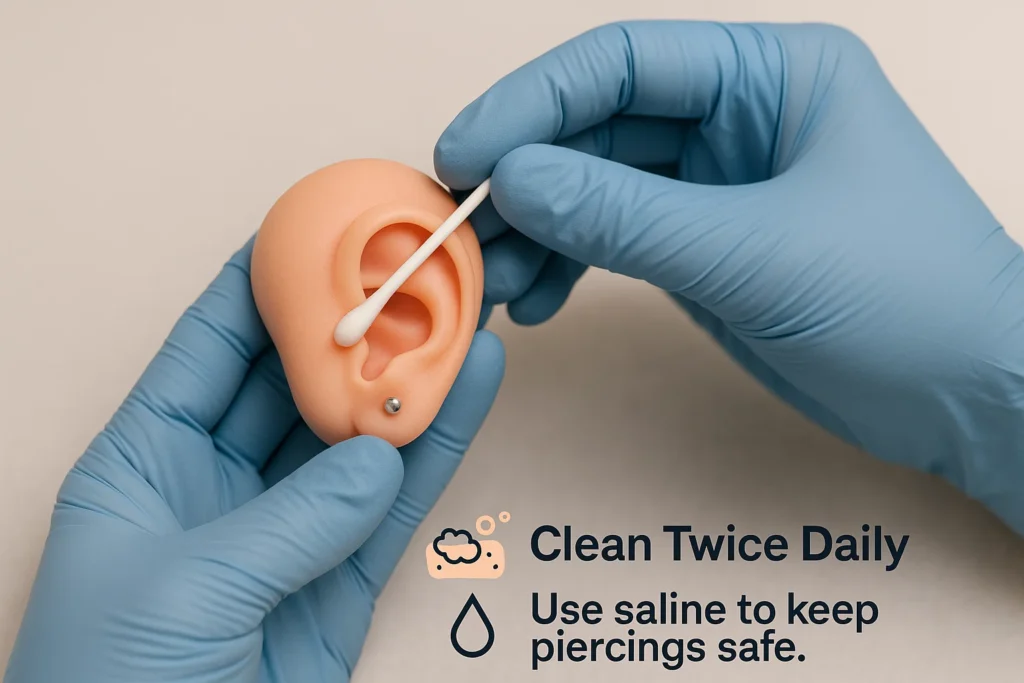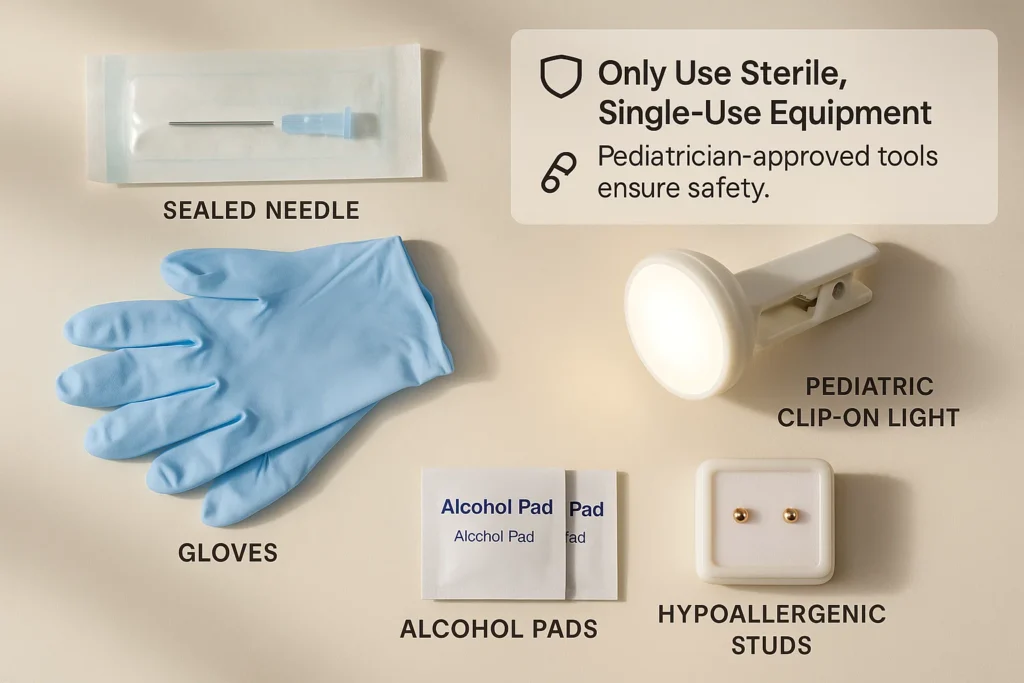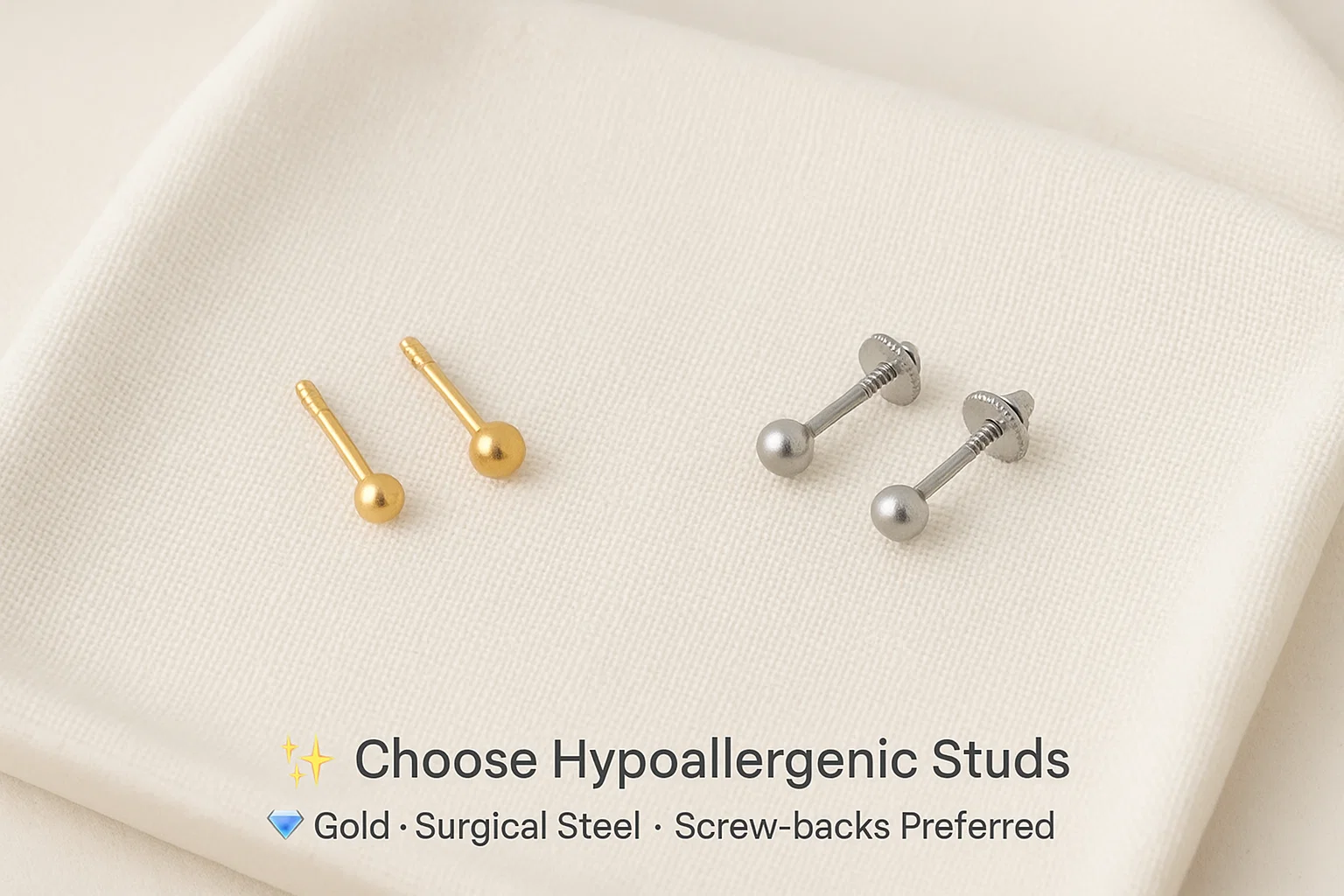Parents often wonder “when is the right age to pierce my baby’s ears?” Pediatric guidelines suggest there’s no single “perfect” baby ear piercing age — it depends on factors like immunizations, your child’s development, and family preference. In general, experts recommend waiting until after your baby has started their routine vaccinations (usually 2–6 months old). This timing helps lower infection risk and gives the baby a stronger immune response. After that, many New Jersey kids doctors advise piercing around 6–12 months or later, when the infant is less likely to fuss and parents can manage aftercare.
TL;DR: Pediatricians at pediatric clinics in NJ recommend delaying ear piercing until after key vaccinations (often 2–6 months old). Older toddlers can usually tolerate piercings with proper supervision. Always use sterile techniques and hypoallergenic earrings, and clean the site twice daily for 4–6+ weeks. When determining the best age for ear piercing for babies, consider your child’s vaccination schedule and temperament.
Recommended Age for Ear Piercing
Infants (0–12 Months)
For newborns and young infants, safety is the top concern when considering baby ear piercing age. Kids doctors in NJ usually advise waiting until your baby has started their vaccination schedule before piercing. In practice, this means after the first DTaP shot (around 2 months). Some pediatric clinic near me will pierce ears as early as 2–4 months old if all routine vaccines are up to date. Early piercing can heal quickly (infants don’t touch the site), but infants cannot tell us if they’re in pain or itchy, and their immune systems are still developing.
Pro Tip: Ensure your baby’s first vaccinations are complete. The CDC/AAP schedule gives the first DTaP vaccine at 2 months, so many New Jersey kids doctors won’t pierce ears until after that. If you choose to pierce before 6 months, be extra diligent with cleaning twice a day and keeping bedding and hats clean. This careful timing helps determine the optimal baby ear piercing age for your child.
Toddlers (1–3 Years)
Toddlers are more active and aware, which has pros and cons. At 1–3 years, many children can understand simple instructions like “hold still” or “don’t touch your earring”. They may even enjoy picking out their earrings. We look for signs of readiness: can your child sit calmly for a minute or two? Are they cooperative during routine check-ups? If so, toddler ear piercing can go smoothly, especially when well-rested and fed. Bringing a favorite toy, snack, or song can distract them during the quick “pinch”. Many New Jersey pediatric clinics find this age range ideal for ear piercing for kids near me searches.
Aftercare Note: Toddlers tend to touch things. Even if they assist in cleaning, a parent must supervise closely. Clean the site daily with saline or mild soap, and keep the earring backs secure. Parents searching for kids ear piercing near me should prioritize facilities with clear aftercare instructions.
Older Children (4+ Years)
Once a child is in preschool or elementary school, they usually handle piercings well. Many 4–5 year olds can hold still on command and may even boast about getting new earrings. At this age, children can participate in aftercare (like cleaning) under guidance. The American Academy of Pediatrics notes that pediatric ear piercing NJ is generally safe at any age if done properly. One thing to note: keloid scars are more common in older kids (especially teens), so earlier piercing might heal with less scar risk. In general, older children recover quickly and enjoy choosing their own stud earrings. Parents should still supervise cleaning and ensure the backs stay on.
Why Wait for Vaccinations?

Medical experts emphasize the role of vaccinations in safe ear piercing when considering baby ear piercing age. Babies under 2 months haven’t received the first round of important shots (DTaP, Hib, polio, etc.), so piercing too early can raise infection risk. For instance, pediatricians at pediatric clinics in NJ advise waiting until after the baby’s first routine immunizations (around 2 months) to minimize hospitalization risk from infections. Our clinic and others follow CDC guidance: we typically pierce infants after their first DTaP shot at 2 months. Some pediatric sources even recommend waiting until 3–4 months once at least 1–2 vaccine sets are complete.
If you are unsure, talk to your New Jersey kids doctor about your baby’s vaccine schedule. As Johns Hopkins notes, the AAP “recommends postponing ear piercings until children are mature enough to take care of the pierced site” (though cultural practices vary). In summary: priority #1 is safety. For parents seeking comprehensive vaccination guidance, our NJ vaccine schedule ensures your baby’s immunizations are up-to-date before an ear piercing appointment. This is crucial when determining the best age to pierce baby ears.
Choosing a Safe Kids Ear Piercing Provider NJ

We know you would ask yourself about Ear Piercing Guns vs Needles for Kids. Not all piercing places are equal, especially for little ears. Always choose a professional setting that follows strict hygiene: pediatrician’s office, accredited tattoo/piercing studio, or a reputable medical spa. Key safety factors: sterile, single-use needles (avoid reusable guns) and hypoallergenic earrings. When searching for ear piercing for kids near me, prioritize safety over convenience. The Riley Children’s Health pediatrician recommends needle piercings over spring-loaded guns, as needles cause less tissue trauma and have sterilizable single-use tips.
When selecting a studio or clinic for pediatric ear piercing NJ:
- Check for proper licensing and clean environment. The piercer should wear disposable gloves and use sterilized instruments.
- Ask about the equipment. Many providers use a medical-grade hand-held device or needle for pediatric ear piercing (our clinic does), not a mall gun.
- Follow Aftercare Instructions Carefully. Any provider should give clear cleaning guidelines and you should follow them diligently.
- Avoid DIY at home. Ear piercing should be done by a trained professional in a clean environment. Home piercing (even with earring studs) risks infection or improper placement.
For example, at our Clifton, NJ pediatric office we use single-use, sterilized needles and medical-grade studs. Each earring is in a sealed sterile package and made of safe metal (14k gold or surgical steel). Sterilize-by-design instruments and trained staff help ensure a medical-grade procedure. Parents throughout New Jersey trust our pediatric clinic NJ for safe, professional ear piercing services.
The Piercing Procedure and Comfort Measures
In our New Jersey clinic, ear piercings are made quick and gentle. We start by cleaning the ear lobes and marking the exact spots, then use a hand-operated sterile device (or hollow needle) to insert the tiny stud. This whole process takes only a second — you’ll likely hear a soft “click” and feel a swift pinch as the earring goes in. We prioritize keeping children calm: you can hold your baby on your lap, sing a song, or let them squeeze a favorite toy. Many offices even use topical numbing cream or a cold pack if needed. Understanding the proper baby ear piercing age helps ensure your child is developmentally ready for the procedure.
Immediately after, we praise the child (and often give a sticker) to reward them. Most kids giggle or smile right away — the pain is very brief.
For busy toddlers or older kids, we schedule the appointment at an optimal time. Try to pick a time when your child is well-rested and fed. A tummy full of milk or a recent nap often means a happier, calmer child. Bring distractions: a pacifier, bottle, or favorite snack can work wonders during those few seconds. We count down or sing a short rhyme to focus their attention. Parents are encouraged to stay close for comfort — the familiar presence of Mom or Dad really helps. This is why many families choose our pediatric clinic NJ for their child’s first piercing experience.
Choosing the Right Hypoallergenic Earrings

Not all earrings are safe for babies. Always use hypoallergenic, medical-grade studs. Recommended materials include 14k gold, implant-grade titanium, or surgical stainless steel. These metals minimize the risk of allergic reaction. Avoid nickel or cheap metal, as nickel is a common allergen. Our New Jersey clinic provides small flat stud earrings designed for infants. For very young children, we use screw-back posts so the back stays locked and won’t pop off (preventing choking hazards). When considering baby ear piercing age, younger children benefit from these secure earring styles.
Earring size matters too: tiny studs (2–3 mm) with smooth backs heal better and catch less on clothing or hair. Many experts advise waiting until fully healed before switching to hoop or decorative earrings. In fact, Johns Hopkins suggests avoiding hoops or dangling earrings during the initial Baby Ear Piercing Healing Time. For more information about selecting the right materials, explore our Hypoallergenic Earrings for Kids guide.
Aftercare for New Ear Piercings
Proper aftercare is crucial for healing and preventing infection, regardless of baby ear piercing age. Follow these steps closely:
- Clean gently twice daily. Wash your hands first, then use a sterile saline solution or gentle soap and water to clean around each piercing. Use a clean cotton swab or pad. Gently remove any crust or discharge (a bit of yellowish fluid is normal healing tissue).
- Rotate the earrings. After cleaning, turn the studs a few times (evenly from front to back) to keep the holes open. Don’t twist too vigorously — just a gentle rotation is enough.
- Keep earrings in place. Leave the initial studs in for at least 4–6 weeks (some doctors say up to 8 weeks). Pulling them out too soon can close the holes. After about 6 weeks, if everything looks healed, you can switch to new earrings under guidance.
- Avoid submerging and irritation. Skip swimming (pools, lakes, bathtubs) and avoid long soaks during the first month. Keep hair, phone cords, hats, and headphones away from the ears to prevent snagging. When washing your hair or taking showers, be gentle near the ear area.
- Watch for problems. Check daily for signs of infection: increasing redness, swelling, or greenish discharge. If your child develops a fever or the ear feels painful to touch, call your New Jersey kids doctor. With vigilant care, infections are rare and heal quickly under treatment.
These steps are echoed by pediatric experts. For instance, Dr. Dawkins from Hopkins advises cleaning with alcohol or saline and keeping earrings in place for 6–8 weeks. The Riley Children’s Health guide similarly warns to avoid hydrogen peroxide or harsh soaps and to keep the area clean. Consistency is key: clean at the same times every day (e.g. morning and bedtime) until fully healed. For comprehensive aftercare guidance, our ear piercing aftercare for kids resource provides detailed instructions regardless of the chosen baby ear piercing age.
Pain and Comfort After Piercing
Most babies and children feel only a quick pinch, and the discomfort fades in seconds. You can soothe your child immediately after the piercing by cuddling or breastfeeding/bottle-feeding — sucking often calms a fussy baby. Applying a cold compress briefly (5–10 seconds) on each ear can also help reduce swelling. If prescribed or recommended, a small dose of infant acetaminophen after the procedure can ease any lingering soreness (check with your pediatrician first).
Remember: crying is normal, but it should not last long. If your baby continues to cry intensely for more than 15–20 minutes after piercing, check the earlobe for any obvious issues (unlikely) and comfort them. Many parents are surprised at how quickly their child recovers — often giggling in the car ride home. The appropriate baby ear piercing age can help minimize discomfort and promote faster healing.
New Jersey Laws and Your Pediatric Clinic
In New Jersey, minors are allowed to get ear piercings with parental consent. There is no state law forbidding infant or child ear piercings, but reputable salons and clinics will always require a parent present and proper identification. For example, our Clifton, NJ office follows all regulations: we obtain your verbal consent and verify any age restrictions. We pride ourselves on offering a sterile, medical environment for pediatric ear piercing NJ rather than a mall kiosk.
If you live in New Jersey, know that you can legally pierce your baby’s ears with you (the parent) present. Many parents prefer a pediatrician near me for such services, trusting the clean setting and medical expertise. At Fayrouz Pediatrics in Clifton, our board-certified pediatricians and nurses perform ear piercings following all safety protocols. We use the same standards we apply to minor medical procedures. Call our Clifton office for details on scheduling a quick appointment — no separate consultation is needed. Our pediatric clinic NJ serves families throughout northern New Jersey with safe, professional ear piercing services.
Contact The Best Pediatric in NJ
Clifton Office
- 1135 Main Ave, Clifton, NJ 07011, United States
- (973) 928-3388
Paterson Office
- 540 Straight St, Paterson, NJ 07503, United States
- (973) 928-3388
Frequently Asked Questions
Here are the most important FAQs pediatric ear piercing:
What is the best age to pierce my baby’s ears?
There’s no one “best” baby ear piercing age, but pediatricians usually recommend waiting until after your baby’s first vaccines (about 2–4 months old) and ideally closer to 6–12 months or older. This timing balances a stronger immune system with the child’s ability to tolerate the procedure. Ultimately, choose a moment when you and your baby are ready (fully fed and rested) and be prepared for diligent aftercare. Many New Jersey kids doctors agree this approach provides the best age to pierce baby ears safely.
Is it safe to pierce my baby’s ears at 3 months old?
Many pediatric clinics in NJ will pierce a 3-month-old’s ears if vaccinations are on schedule. Johns Hopkins suggests 3–4 months (after at least 1–2 vaccine sets), and some practices do it as early as 2 months. If your pediatrician Clifton NJ approves and follows sterile technique, 3 months can be safe. Just be extra careful with cleaning, as younger babies have smaller piercing holes. This is within the acceptable baby ear piercing age range when proper precautions are taken.
How do I care for my baby’s new ear piercings?
Clean the pierced area gently twice a day with saline or mild soap, washing your hands first. Rotate each earring slightly a few times during cleaning. Keep the earrings in for 4–6 weeks straight. Avoid getting shampoo, sweat, or pool water in the ears while healing. Watch for any redness or discharge — if those appear, see a doctor. A basic aftercare schedule and observing healing are key to success, regardless of your chosen baby ear piercing age. Many families find ear piercing for kids near me services at our New Jersey clinic provide excellent aftercare support.
Can I do a baby ear piercing at home?
It’s strongly not recommended. Homemade piercings (even with a needle or gun) carry high infection risk. Always use a professional setting with sterile equipment. Pediatricians and trusted piercing studios have the proper tools and training, which you can’t replicate safely at home. Our pediatric clinic NJ ensures all safety protocols are followed for optimal results.
What kind of earrings should I use for my baby?
Use sterilized studs made of gold or surgical steel. These metals are least likely to cause allergies. Avoid dangling or hoop earrings during healing; start with flat-backed studs. Many experts also recommend screw-back earrings for infants so the backs stay locked in place. When searching for kids ear piercing near me, ensure the provider uses only high-quality, hypoallergenic materials regardless of your chosen baby ear piercing age.